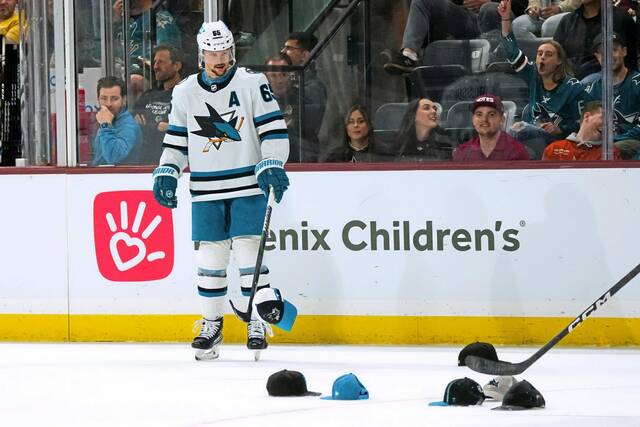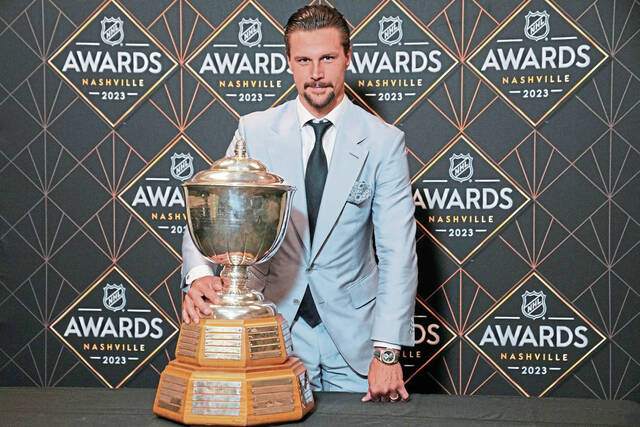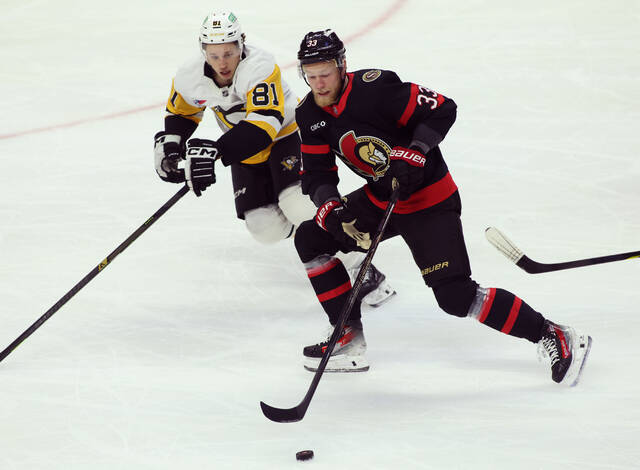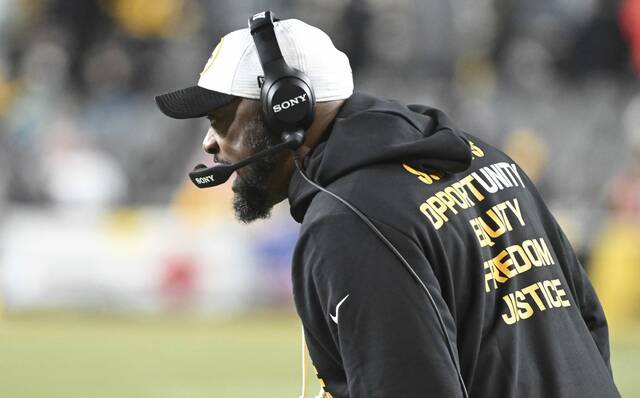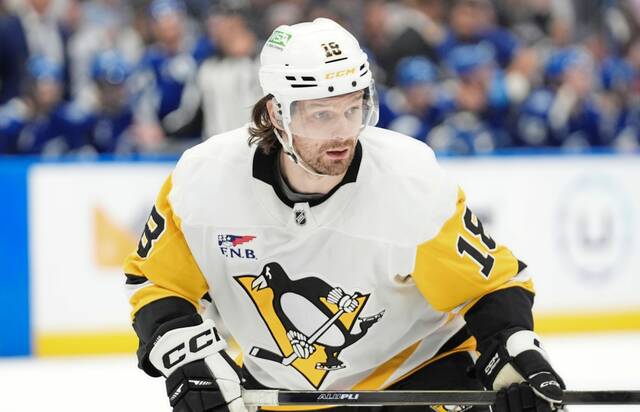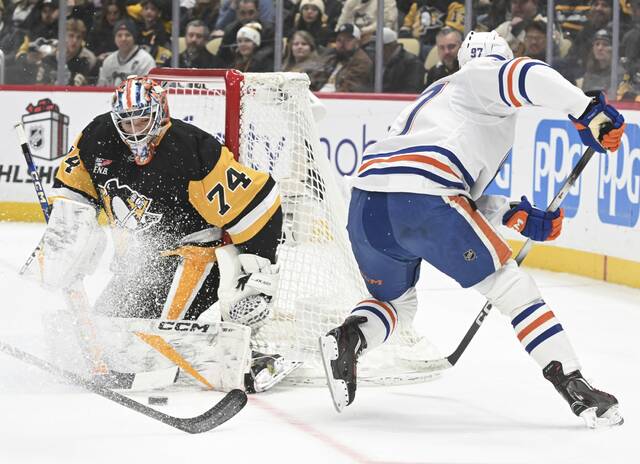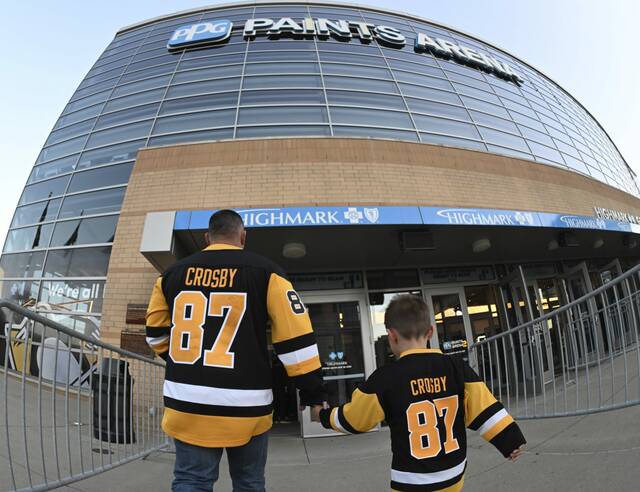Stop us if you’ve heard this story before.
It’s about the time the Pittsburgh Penguins lost their way and were in dire need of a course correction.
So, they were prompted to make a seismic, franchise-altering trade to bring in an offensive dynamo who could fundamentally alter the organization on several levels.
But there were some imperfections — particularly regarding defense — and a few odd quirks with this new player.
Such as his fondness for hot dogs.
No, not Phil Kessel.
You’ve heard that tale of him eating hot dogs in Toronto — which wasn’t very valid — and have seen all the memes and social media hashtags about frankfurters that followed Kessel when he joined the Penguins in 2015 then were amplified as he become a folk hero for helping the team to Stanley Cup championships in 2016 and 2017.
This is about Erik Karlsson.
And he likes hot dogs. At least the famous ones served at the Bell Centre in Montreal.
“You go to Montreal, they’re known for their hot dogs,” explained Marc Methot, Karlsson’s longtime defense partner from their days with the Ottawa Senators. “We got there one day before a game, a relatively important game. I go into the back room where we all tape our sticks, which is separate from the main dressing room. I walk in and Erik is sitting there, smashing hot dogs.
“That’s not a common thing. Guys are usually eating a banana, something healthy, having a coffee at the rink. But three (expletive) hot dogs? And he was just back there one-timing them. All I could think was ‘(Expletive), I’m going to have to pick up the slack now in the (defensive) zone.’ It’s not going to feel good in his gut. But he ended up having a great game. I’m pretty sure he scored that game and helped us win. He’s just one of those guys. He’s the very definition of a natural talent.”
Karlsson doesn’t dispute Methot’s account.
“I’ve done that since, I think my (rookie) year,” Karlsson said. “Hot dogs in Montreal before the game is the standard for me now. It became kind of my thing.”
Karlsson’s most prominent thing as an NHLer is being the game’s most dominant offensive force from the blue line. A mere 14 years into his dazzling career, he has scored 761 career points in 920 games. An obscene 101 of those points came last season in 82 games as a member of the San Jose Sharks.
The last blueliner to reach the century mark was Brian Leetch of the New York Rangers, who had 102 in 1991-92.
For a variety of reasons, Karlsson is not a normal defenseman.
“First of all, the confidence to do half the stuff that he does, I think, is what separates him from most defensemen in the league,” said Methot, today a broadcaster in his native Ottawa. “He’s not shy to try new things to get very creative. His ability to get up the ice, (geez)! You knew there was a good chance when Erik gets the puck up the ice, he’s not going to turn it over. He manages the puck so well despite being high-risk in many cases, sometimes in his own end. But transitioning and going up the ice, you know he’s going to make a good play with the puck. He’ll feed a guy across ice or make a short 10-foot pass. You can always rely on him to make the right play.
“If I had the puck in the (defensive) zone under pressure and Erik was always like a third option at net front if our low center was covered (or) if the winger was taken away, I could always hit Erik. He’s so good at making himself available. You have to attribute it to the fact that just wants the puck on his stick all the time.”
Blue line revolution
A first-round pick (No. 15 overall) of the Senators in 2008, Karlsson carried heavy expectations upon entering the NHL as a rookie in 2009-10. But the NHL’s landscape was very different in terms of what was expected of most defensemen. And the types of defensemen who populated blue lines at that time were different.
In his first career game, a 5-2 road loss to the New York Rangers on Oct. 3, 2009, Karlsson skated in a lineup that included defensemen such as Matt Carkner (6-foot-4, 227 pounds), Filip Kuba (6-4, 225), Chris Phillips (6-3, 219) and Anton Volchenkov (6-1, 220).
Karlsson, at 6-foot, 190 pounds, was the outlier from a group of bigger defensemen who mostly were expected to mix things up physically, block shots and just, in general, impede offense.
Today, those types of defensemen are about as common as a wooden stick or a standard-definition broadcast. Most teams’ fifth or sixth defensemen are expected to have some competence at moving the puck up ice for offensive intent.
As Karlsson explains it, “Now, I’m one of many.”
In all reality, there have never been many like Karlsson.
“To play against him, it’s tough,” said Penguins forward Matt Nieto, a former teammate with the Sharks. “He’s really hard to forecheck because he’s so elusive. He has the ability — where you think you have him trapped — he’s able to escape and leave you in the dust. When you’re on the other end of it, when you’re playing with him, you just try to find open ice because it seems like he’s got eyes in the back of his head out there. So when you’re least expecting it, expect it to be on your tape.”
It might be hyperbole to say Karlsson single-handedly changed the game the same way the great Bobby Orr did in the 1970s. But in the 2010s, NHL teams began to demand all their defensemen be more offensively minded.
Karlsson was at the forefront at that shift as evidenced by the three times he has won the James Norris Memorial Trophy that recognizes the NHL’s top defenseman.
“It was a little bit different back then with how it was played and the people that were in your lineup back then,” Karlsson said of his first years in the NHL. “I didn’t really fit that mold. This is what I’ve always done, and this is the player I’ve always been. I just kept being that. Now, here we are and it feels like everybody is doing that, the same thing.
“That’s the way the game is played now. When I came in, that was not the case. I just did me and stuck with it.”
Defending his record
Something that has stuck with Karlsson, fairly or unfairly, is a common criticism that his approach comes at the expense of sound, reliable defense.
He acknowledges that viewpoint, even if he strongly disagrees with it.
“I’ve had many seasons where we’ve been playoff teams, and no one has really mentioned my defensive game,” said Karlsson, 33. “Then I’ve had many seasons where we’ve been at the bottom of the standings and I’m having a good year and, yeah, we’re not playing good defense. No one is. That’s why we’re at the bottom of the standings. I think it’s all variables.
“I think I’m good defensively. I have no problem with people saying otherwise. This is what people expect me to do. This is why I’m here. This is why I get paid what I do. If I don’t do those things, then I’m not the player that I am. That’s probably the narrative that, unfortunately, I’m probably going to have for the remainder of my career. That’s just the way it is. I’m not going to change it.”
Competitive fire
Something that won’t change about Karlsson, as he takes his first steps with a new team, is his personality. That’s to say while he will certainly respect the established hierarchy the Penguins have with leaders such as Sidney Crosby, Evgeni Malkin and Kris Letang, Karlsson won’t be a wallflower.
He wasn’t with the Senators or Sharks.
“Got into a lot of ‘(expletive) you’ matches with him on the bench, just like everybody else did at times,” Methot said. “Understand that Erik is very passionate. You’re going to get into the odd argument with him here or there. And I mean that in the best way possible. I don’t view that as a negative whatsoever. Players that have some of the best chemistry are able to have some of those uncomfortable conversations sometimes if one guy isn’t rolling the way he should be or vice versa.”
Marcus Pettersson is expected to serve as Karlsson’s partner to open the season and figures to be on the opposite end of those types of exchanges. So far, there haven’t been too many of the “matches” Methot outlined.
“The energy that he brings into the rink, not only with (how) good a player he is, but he comes in with a smile,” Pettersson said. “You can hear his voice from the other side of the room. Just the energy he brings, I feel like we’re really excited about him.”
Much of that jubilation lies in the hopes of how Karlsson’s nonpareil skillset can fit into the Penguins’ scheme, which typically has been aggressive offensively given the presences of Crosby, Malkin and Letang.
But Karlsson simply sees the way the Penguins do things as a way of life for most of the NHL.
“I’ve played pretty much every system there is to play now, unless someone is reinventing something that we haven’t seen yet,” Karlsson said. “There’s nothing really new. I don’t think that it’s going to be any different for me or anyone else to kind of figure out how it works and what we have to do.”
Crowning achievement
While Karlsson has a stacked resume based on his career accomplishments, a considerable omission is a Stanley Cup championship. The closest he came to that accomplishment came in 2017 when the Penguins eliminated his Senators in the 2017 Eastern Conference final, a series that was determined in the second overtime of a seventh game.
“He’s always wanted to win,” Methot said. “But as you get into your 30s, you start realizing the window starts to close. You realize how difficult it really is to win the Stanley Cup. … Knowing him and his competitive nature, he just wants to win. He’ll do anything it takes to get there. If it means a diminished role as a leader, he’ll do it. If it means stepping up as a leader and helping out there, he’ll do it. He can do it any which way you like.”
For the Penguins, they moved heaven and earth — or at least former defensemen Jeff Petry and Jan Rutta off the roster — in order to get a player who largely has played a game seemingly only he can play.
“This is what they want me to do, and this is what I do well,” Karlsson said. “That’s kind of always how my approach has been. This is what got me here. Why change now?”







